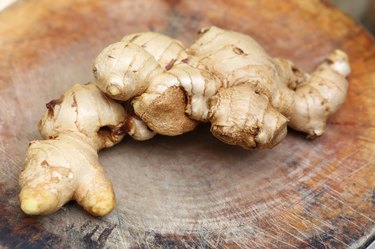
You might have heard that ginger is a helpful herbal medicine and that it can relieve some digestive difficulties. While it's true that ginger is a traditional remedy for certain digestive ailments, but it doesn't have any utility in helping treat constipation. Talk to your doctor if you have concerns about using ginger.
Ginger
Video of the Day
Ginger is the root of a tropical plant and has long been part of the herbal armamentarium. Ginger root is popular in cooking -- especially in foods with an Asian flair -- and also adds zest to baked goods. The spicy-hot flavor of ginger -- and some of its medicinal power -- comes from a molecule called zingerone, explain Drs. Penny Le Couteur and Jay Bureson in their book "Napoleon's Buttons." Zingerone is related to the capsaicin in hot peppers.
Video of the Day
Ginger and Digestion
According to the University of Maryland Medical Center's Index for Complementary and Alternative Medicine, ginger has utility as an anti-nauseant. It helps relieve the nausea and vomiting associated with motion sickness and with the morning sickness common to early pregnancy. The latter use is particularly convenient, because pregnant people can't use many of the pharmaceuticals available to the non-pregnant population. There is no evidence to support the use of ginger in treating constipation, however.
Why Ginger Works
The reason ginger helps treat nausea -- but can't help with constipation -- is that the spicy molecule zingerone binds to pain receptors. This sends a pain signal to the brain, and the brain can't simultaneously process this signal and the signal coming from the gut that indicates nausea. As a result, you won't feel nauseated for a short time after eating ginger. Because ginger has no direct effect on the gut, however, it can't affect digestion or constipation.
Treatments
If you're constipated, effective treatments will vary somewhat depending on the reason for your bowel trouble. For instance, low-fiber diets can cause constipation, and the remedy for this is to eat more fiber. Dehydration can also cause constipation, and drinking more water will help. There are also medical causes for constipation, and your doctor can help you determine the cause -- and the effective treatment -- during a medical exam.
Is this an emergency? If you are experiencing serious medical symptoms, please see the National Library of Medicine’s list of signs you need emergency medical attention or call 911.